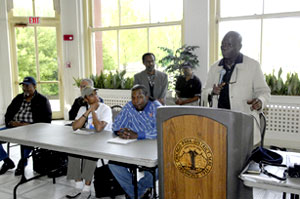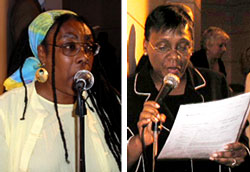UN special investigator tours U.S. to probe major domestic problem
Letters from Leonard Peltier – reminder of genocide against Indians (FCN, 12-22-2003)

NEW YORK (FinalCall.com) РDoudou Di̬ne, a Senegalese lawyer and a United Nations expert, kicked off a multi-city U.S. tour by hearing testimony in Harlem about the problem and impact of racism in America. Advocates are hoping his tour will help expose deep racial disparity in the United States and the hypocrisy of a nation that champions human rights protections abroad but fails to live up to the same standards at home
Mr. Diène is a Special Rapporteur on Contemporary Forms of Racism, Racial Discrimination, Xenophobia and Related Intolerance and reports to the United Nations Human Rights Council, which is based in Switzerland. Special rapporteurs are independent experts appointed to three-year terms who monitor, advise and publicly report on human rights issues in different nations.
The expert on racism came to Harlem May 21 to hear testimony about America’s racial divide and possible solutions from New Yorkers and others. Mr. Diene will also meet with federal, state and local officials, political and social leaders. His schedule included stops in Chicago, May 23-24; Omaha, Neb., and Los Angeles, May 25-29; New Orleans, May 30-31; Miami, June 1-2; San Juan, Puerto Rico, June 3-4; and Washington, D.C., June 5-6.
Human rights, civil liberties and civil rights organizations inside the United States have asked Mr. Diene to examine continued racial discrimination in criminal justice, education, housing, juvenile justice and the treatment of immigrants. He is scheduled to make a public report with recommendations for action through the Human Rights Council to the UN General Assembly in the spring of 2009.

The American Civil Liberties Union, Global Rights, the Lawyers’ Committee for Civil Rights Under Law, the U.S. Human Rights Network, the NAACP Legal Defense Fund, the Rights Working Group and the National Law Center on Homelessness & Poverty called on state and local governments to fully cooperate with the UN investigator.
These groups have already compiled and given huge reports and data related to racial disparities to the United Nations, which were accepted by the Human Rights Council.
“The visit of the special rapporteur is a critical opportunity to shed light on the pervasive and systemic problem of racism and discrimination in the United States,” said Jamil Dakwar, director of the ACLU Human Rights Program. “In this election year, the eyes of the world will be turned toward America and its longstanding promise to end racial and ethnic inequalities.”
“The special rapporteur’s visit presents a unique opportunity to give voice to those combating racism in the U.S. and will bring our concerns to the UN and its enforcement mechanisms,” said Aubrey McCutcheon, Global Rights director of programming. When a country ratifies a UN treaty, it becomes responsible for periodic reports related to compliance with treaty obligations. The U.S. is required to report on progress against racism because of such agreements.
According to Dr. Conrad Worrill, chairman of the Chicago-based National United Black Front, who had a special May 24 lunch meeting with Mr. Diene, the investigator’s tour is “a continuation of the work started by Min. Malcolm X, W.E.B. DuBois, William Patterson and Martin Luther King, Jr. His presence here is a lifting up to the world the message that racism is alive and well in America today.”
Dr. Worrill noted this was the second visit by a special rapporteur to the U.S. to study racism. Special Rapporteur Maurice Glele-Ahamhanzo presented a report to the General Assembly in 1996 that noted growing racial tension in America and racial animosity expressed after the acquittal of O.J. Simpson in the murder of two White victims and reaction to the 1995 Million Man March.
A UN panel meeting in March, in Geneva, examined reports submitted by the Bush administration on issues of racism and racial discrimination, and urged the U.S. government to halt racial profiling of Arabs and Muslims. The report also noted some 800 racially motivated incidents in the U.S. since 9-11, urged a moratorium on the death penalty and end to sentencing youth offenders to life in prison until racial bias in the justice system is uprooted.
Human rights and U.S. hypocrisy
Activists attending the May 21 Harlem forum called it an historic day at the Schomburg Center for Research in Black Culture at 135th and Malcolm X Boulevard. The December 12th Movement International Secretariat & International Association Against Torture, a Brooklyn-based non-governmental organization, organized the gathering.
Omowale Clay, of the Dec. 12th Movement, told The Final Call the special rapporteur’s visit is part of an “international campaign to expose the denial of Black people’s human rights in the U.S.–to expose the U.S. hypocrisy.”
American Civil Liberties Union Human Rights Program attorney Chandra Bhatnajar argued the visit has special significance because of developments on the world scene. “There is a change taking place in the international community, just look at how the International Committee Against Torture forced the Bush administration to back up on its treatment of prisoners at Guantanamo Bay,” he said.
The report will help place American racism on the front burner in the world body, said Atty. Bhatnajar.
Other advocates say the beating America’s image has taken during the Bush administration–including the deaths amid shameful federal government failures during Hurricane Katrina–and an upcoming presidential election could help make Mr. Diene’s 2009 report on American racism especially valuable.
“I am here because it is important to see how the U.S. is handling its issues of racism; how it is coping with its legacy,” Mr. Diene told the gathering at the Schomburg. “The international community wants to know,” he said.
Witnesses in Harlem ranged from representatives of longtime anti-racism groups and activists to the relative of a high profile victim of a deadly police encounter to ordinary people, who came to simply be heard and ask for help.
The lead-off speaker was Valerie Bell, whose son Sean Bell was killed in a hail of 50 bullets fired by undercover NYPD officers in 2006 just hours before he was to be married. Three officers charged in the unarmed man’s slaying were acquitted by a Queens judge. “Police brutality is another type of racism. We are unable to view the police as our protectors,” Ms. Bell said.
“There is racism in the educational system in New York City and New York State, manifested by the failure to include the true history of Black people in the curriculum; and by the inability of parents of color to adjudicate the failure of the educational system,” Dr. Adelaide Sanford, vice chancellor of the New York State Board of Regents explained to Mr. Diene.
“Racism is alive, well, and growing in this country,” stressed Dr. Sanford, a longtime educator and activist. “It impacts our people in housing, banking, public policy and policing. We all know that it exists, the question is, what are we going to do about it?” Dr. Sanford said.
Vanessa James, a mother from Queens, brought tears to the eyes of many in the audience, as she recounted how the New York Administration for Child Services took custody of her five-year-old daughter, saying she and her husband made too many visits to the doctor.
Other witnesses included Ramona Africa of the Philadelphia-based MOVE organization; Imam Al-Hajj Talib Abdur-Rashid of the Mosque of Islamic Brotherhood in Harlem and Haitian American activist Dahoud Andre. Attorney Tariq Salim Warren testified about political prisoners in the U.S. and cited the cases of Philadelphia death row inmate Mumia Abu Jamal and former Black Liberation Army members on the west coast, the San Francisco 8, who are accused of killing police officers.
The ACLU published a map online that detailed some of the human rights issues facing Blacks and people of color in the United States. Some of the ACLU findings included:
– An ACLU study in New York documented disparities in the criminal justice system because of biased government policies and unequal treatment of minorities;
-The 10 neighborhoods with the highest subprime mortgage rates in the U.S. were in predominately Black and Latino communities;
-In Illinois, 54 percent of prisoners in the juvenile justice system are Black;
-A Chicago Breast Cancer Task Force report showed the death rate for Black women was 68 percent higher than White women;
-In California, children of color are sentenced to life without parole at a 20 to 1 ratio when compared to Whites;
-Schools with high concentrations of Black and Latino students were 11 times more likely to have a higher percentage of under-qualified teachers;
-In New Orleans, police checkpoints caused an increase in complaints because of the disproportionate impact on Black neighborhoods;
-In Florida, Blacks are disproportionately sentenced to death; and Florida has approximately one million, including 300,000 Blacks, of the 5.3 million disenfranchised voters in the United States;
-Thirty-one percent of students transferred to alternative schools were Black and 20 percent are Black males, who are just seven percent of the student population.
“The United States is an imperial power and part of their authority is that they carry this mantle of legitimacy,” explained Stan Willis, a civil rights attorney and chair of Black People Against Torture, following a May 24 hearing with Mr. Diene in Chicago. “When you attack that by saying, ‘wait a minute what’s happening to the torture of Black men in the United States?’ It kind of takes the sheet off the United States.”
Part of the reason why the U.S. thumbs its nose at the United Nations is because Americans are ignorant about the world body and how to use it for social change, Atty. Willis argued. The more Blacks are involved in the international arena, the more direction can be given to elected officials about what positions to take on UN matters, he said.
Mr. Willis added that pushing Black concerns in the international arena does not replace hard work on the ground in America. The work against racism has to continue on the domestic front, but Blacks should learn and use the United Nations structure as another tool against oppression, he said.
“We have to take our case to the world,” said New York activist and Atty. Tariq Warren. “But, in the end it is on us,” he added.
Activists like Pam Africa, president of the International Concerned Family and Friends of Mumia Abu Jamal, echoed that pragmatic sentiment. “We can expect nothing from the UN. The important part of today is the networking and linking up with others to expand the struggle,” she told The Final Call.












